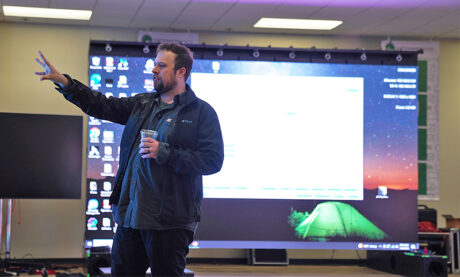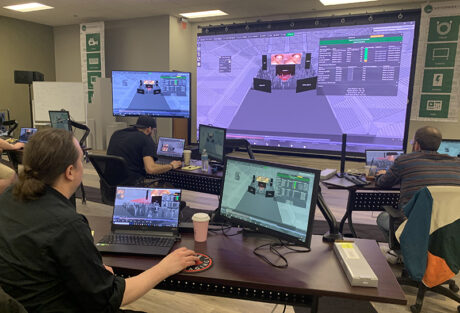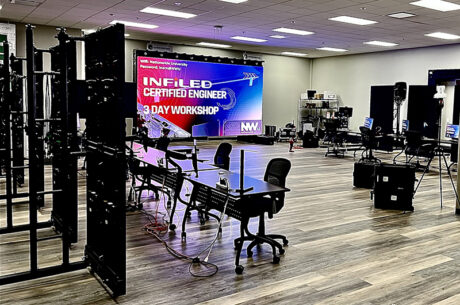
Nationwide Video, with facilities across North America, is a leading provider of cross-rental equipment to the live entertainment and event rental and staging industry. Their Nationwide University (NWU) provides training industrywide for technicians and video engineers to get up to speed on a variety of video equipment and workflows. This training effort is led by Kevin Ring, who has been with NW for the past two years. The NWU program has already trained nearly 400 technicians and engineers to date. We spoke with Ring about the well-respected training program that Nationwide has developed.
Tell us about Nationwide University, what it is, where, etc.?
Nationwide has been doing trainings really since its inception. However, previously training would happen if a warehouse or QC technician was available, you could come on down and they’d show you the ropes. I joined Nationwide about two years ago. Before that I was a Senior Support and Training Specialist at disguise. Before that I was with Evolve Media Group out of Las Vegas, where I managed image processing, new media, and education. I’ve been a Barco trainer for about 10 years now on the Event Master toolset systems in virtual Encore. I’m also a professor at CalArts for immersive media. So, when I came to Nationwide, we created a curriculum-driven, syllabus-based training by partnering with the manufacturers. By partnering with companies such as Barco, disguise, Christie, NovaStar, we have now created actual accredited courses that the manufacturers recognize and give manufacturer’s certifications for upon completion.
We have a dedicated training headquarters at our Irvine, CA facility. We just opened a new facility in Wixom, MI, our main headquarters location near Detroit. We do also travel with training, with our road shows. We also offer every class as private, on-demand training classes. So, half of my calendar is going to customer locations and offering trainings, at their facilities. We’re trying to do about three to four trainings a month. Sometimes we’re doing more, and they range on everything from projection, blending, twisting, warping, stacking, LED with NovaStar and Brompton, camera engineering, etc. We do a bunch for media servers, disguise, Pixera, as well as Barco Event Master, that is one of our most popular courses the Barco Event Master tool set for the E2 Series. Also we offer Christie with their X80 series, content creation with Notch and Unreal Engine. We’re always trying to find the next thing. We like to take technicians and turn them into engineers. Students come in for two to four days for hands-on, in-depth experience. We teach everything from the perspective of the live event video technician and live event video engineer.
That is a luxury that we have compared to the manufacturers, is we’re not trying to reach multiple verticals. If you’re a manufacturer you have to teach for permanent installations, rental & staging, government work, etc. We have the flexibility to teach specifically towards the live event technician. In addition, another flexibility that we have is, we are agnostic to companies. We carry everything in rental and more importantly than that, we can look beyond just one box. I used to work for disguise, heading up support and training. As a manufacturer, we had to be very particular about where our training started and where it ended. At what point is it an LED processor issue? At what point is it a projector issue? At Nationwide, because we carry the full suite of products, we’re able to discuss the inputs, the outputs, the processing, and everything in the chain. We know a piece of video equipment is just one piece of a larger puzzle and a larger ecosystem. So, we talk about the entire element in the entire signal chain. It is like I always say, quoting Walt Disney—’it’s not your fault, but it is your problem.’ We teach to be able to solve the problem.
So, even though you’re, say training on disguise, you will get into the things like the signal flow the workflow, other parts of the whole system, etc.?
100%. Yes, we’re talking about disguise, however, if we’re interfacing with an LED processor, we need to know how to set up the X/Y coordinates for the LED wall. We need to know the type of signals that it accepts, if we’re taking in a live input, we need to see the differences of interlace versus progressive 6G versus 12G SDI, or 3G, or Quad link. Once again, it is that quote I love, ‘it’s not your fault, but it is your problem.’ So, we try to alleviate those problems. I also like to quote Jethro Bodine from the Beverly Hillbillies. We talk about the ‘gazinta’—what goes into this, what goes into that.

The training is open to anyone in the industry, right?
This is not exclusively for Nationwide employees; well, Nationwide technicians can join, but this is for freelance technicians, full-time employees of other companies, IATSE technicians. We get people from all over. We partner with local unions, and we offer discounts to IA members. I would say the majority of those who we train are freelancers. We’ve learned that freelancers do make the world go round. We’ve felt that if we can empower the freelancer, empower the end technician, it helps the goals of all the production companies around the country.
Talk about the value of this kind of training when the industry’s looking for so many people.
Absolutely. Obviously, Covid created a labor shortage and a labor gap. You cannot recreate experience in the field. That cannot happen. People still need to get out there and do things, but we are all noticing a large gap in skilled technicians to do the higher-level shows. In addition, we’ve noticed that the expectations of the client and the customer have exceeded exponentially with the reopening from Covid. People are looking for a more engaging and more immersive experiences. The days of a single screen with a small switcher are done. So, the expectations of the skills of the technician are much higher than they were before. Our goal is, once again, is to partner with the manufacturers and offer the technicians the training to learn what the manufacturers intend—the workflow of their system; to really help them be comfortable, to be able to troubleshoot, to exceed these expectations of the customers. We want to know that they’re going to be confident in the field. An engineer technician will be responsible for 10,001 different things when they’re on show site. So, if we can take away one of their pain points—whether it be a switcher, a processor, an LED system, a media server—then we think we’ve done our job well. Plus, I have a real interest in good training, I do tech support for Nationwide as well, and we’ve realized that by training the technicians to a very high level, the number of tech support calls also diminishes. Since I’m the guy who gets the calls at 11:00 p.m. on a Sunday, that’s a win-win for me as well.
Is there a basic level that technicians need to have before they come into your training?
It depends on the course. We offer intro courses for those who are completely new to the system. We do an intro to image processing, screen switching. Of course, camera engineering is more introductory, but then we also offer advanced courses that have prerequisites. Barco is a great example. We offer three levels of Barco training—what we call Operator, Specialist and Expert. So, depending on where the technician sits in their skillset, based off prior experiences, we have the appropriate course for them. Or better yet, we have a path for them to go once they’ve taken the intro levels and then want to increase their skillsets.
We try to do hands-on training. We use our real-world experiences in the field. I’ve been an engineer doing this for about 20 years, and we deal with the manufacturers. We treat everything at the scientific, technological, and engineering level. Even an introductory course. If we look at the science and engineering and technology behind what it is that we’re doing, it makes the troubleshooting so much easier. We demystify video and the process of being a video technician by looking into the science and technology behind the workflow. It’s one thing to press a button and to see an action occur, it’s another thing to understand the action that’s occurring.

Do you train in other areas outside of video?
Not now, but we are always expanding. One thing that we are going to be launching is a networking course. We see that we’re at this paradigm shift in the industry where AV is becoming IP. The days of a static IP address versus DHCP, that’s not enough. We will address SMPTE ST 2110 [Professional Media Over Managed IP Networks suite of standards] which is their first AV over IP infrastructure where every signal will need to have a unique IP address. Our goal is to get the attendees more familiar with this because we now see that network engineering is going to become an integral part of the future. So, our goal is to not only make sure our attendees have the skillsets of today, but to have the skillsets of tomorrow.
For further information on training with Nationwide University, please visit: www.nationwidevideo.com/training


